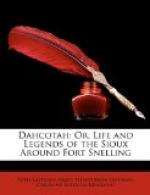But sorrow mingles with the remembrance of that bright day. One of those who contributed most to its pleasures is gone from us—one whom all esteemed and many loved, and justly, for never beat a kinder or a nobler heart.
CHAPTER III.
Shah-co-pee has looked rather grave lately. There is trouble in the wigwam.
The old chief is the husband of three wives, and they and their children are always fighting. The first wife is old as the hills, wrinkled and haggard; the chief cares no more for her than he does for the stick of wood she is chopping. She quarrels with everybody but him, and this prevents her from being quite forgotten.
The day of the second wife is past too, it is of no use for I her to plait her hair and put on her ornaments; for the old chief’s heart is wrapped up in his third wife.
The girl did not love him, how could she? and he did not succeed in talking her into the match; but he induced the parents to sell her to him, and the young wife went weeping to the teepee of the chief.
Hers was a sad fate. She hated her husband as much as he loved her. No presents could reconcile her to her situation. The two forsaken wives never ceased annoying her, and their children assisted them. The young wife had not the courage to resent their ill treatment, for the loss of her lover had broken her heart. But that lover did not seem to be in such despair as she was—he did not quit the village, or drown himself, or commit any act of desperation. He lounged and smoked as much as ever. On one occasion when Shah-co-pee was absent from the village the lovers met.
They had to look well around them, for the two old wives were always on the look out for something to tell of the young one; but there was no one near. The wind whistled keenly round the bend of the river as the Dahcotah told the weeping girl to listen to him.
When had she refused? How had she longed to hear the sound of his voice when wearied to death with the long boastings of the old chief.
But how did her heart beat when Red Stone told her that he loved her still—that he had only been waiting an opportunity to induce her to leave her old husband, and go with him far away.
She hesitated a little, but not long; and when Shah-co-pee returned to his teepee his young wife was gone—no one had seen her depart—no one knew where to seek for her. When the old man heard that Red Stone was gone too, his rage knew no bounds. He beat his two wives almost to death, and would have given his handsomest pipe-stem to have seen the faithless one again.
His passion did not last long; it would have killed him if it had. His wives moaned all through the night, bruised and bleeding, for the fault of their rival; while the chief had recourse to the pipe, the never-failing refuge of the Dahcotah.
“I thought,” said the chief, “that some calamity was going to happen to me” (for, being more composed, he began to talk to the other Indians who sat with him in his teepee, somewhat after the manner and in the spirit of Job’s friends). “I saw Unk-a-tahe, the great fish of the water, and it showed its horns; and we know that that is always a sign of trouble.”




